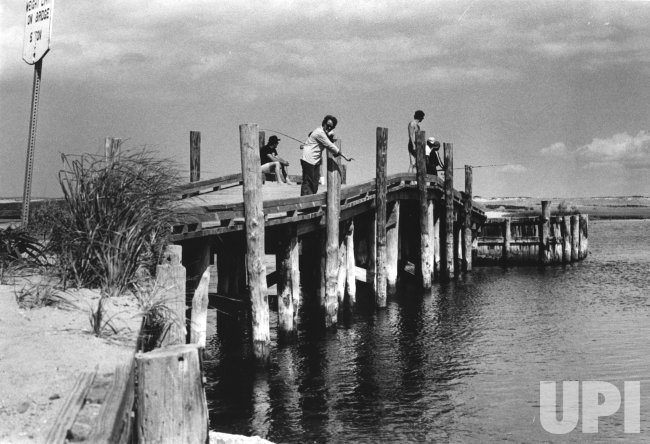The site of the Chappaquiddick incident involving Sen. Ted Kennedy and Mary Jo Kopechne
The Chappaquiddick incident refers to the circumstances surrounding the 1969 death of Mary Jo Kopechne, a former staff member in Senator Robert F. Kennedy's 1968 presidential campaign. U.S. Senator Edward M. Kennedy of Massachusetts was driving a car with Kopechne as his passenger when the Senator drove off Dike Bridge into the channel between Chappaquiddick Island and Martha's Vineyard. The Senator swam to safety, but Kopechne died in the car. Kennedy pled guilty to leaving the scene of an accident and received a suspended sentence of two months in jail. The incident became a national scandal and may have affected the Senator's decision not to run for President in 1972. Ted Kennedy attended a party on Chappaquiddick Island, adjoining Martha's Vineyard. The party was a reunion for campaign workers who had served in his brother Robert's 1968 presidential campaign. Kennedy drove away with party guest Mary Jo Kopechne as a passenger in his mother's 1967 Oldsmobile Delmont 88. According to Kennedy, he made a wrong turn onto an unlit dirt road that led to Dike Bridge (also spelled Dyke Bridge); a wooden bridge angled obliquely to the road with no guardrail, and drove over its side. The car plunged into tide-swept Poucha Pond (at that location a channel) and came to rest upside down underwater. Kennedy was able to swim free of the vehicle, but Kopechne was not. Kennedy claims he tried to swim down to reach her several times, then rested on the bank for several minutes before returning on foot to the Lawrence Cottage, where the party attended by Kopechne and other "Boiler Room Girls" had occurred. One of the "Boiler Room Girls" is now big-time New York literary agent Esther Newberg, who was Mary Jo's roommate for the weekend. Like everyone involved in the incident, Esther remains close-mouthed about what occurred. Joseph Gargan (Kennedy's cousin) and party co-host Paul Markham then returned to the pond with Kennedy to try to rescue Kopechne. Although there was a telephone at the Lawrence Cottage, nobody called for help. When their efforts to rescue Kopechne failed, Kennedy decided to return to his hotel. However, the Edgartown-Chappaquiddick ferry (which connects Chappaquiddick to the rest of the island) had shut down for the night. Kennedy swam across the 500-foot channel, back to Edgartown. The next morning, the police recovered Kennedy's car and the body of Mary Jo Kopechne. Kennedy discussed the accident with several people, including his lawyer and Kopechne's parents, before discussing it with the police the next morning. Her death was ruled an accidental drowning, and no autopsy was performed. Kennedy entered a plea of guilty to a charge of leaving the scene of an accident after causing injury. He received a sentence of two months in jail, which was suspended. The sentence was notable in that the statute for the crime provided only for mandatory jail time and not the discretion of a suspended sentence. An Edgartown grand jury later reopened the investigation but did not return an indictment. The incident quickly became a scandal. Kennedy was criticized for failing to save Kopechne, for failing to summon help immediately, and for contacting not the police but rather his lawyer first. It is widely believed that the Chappaquiddick incident was the major factor in Kennedy's decision not to run for president in 1972. The case resulted in much satire of Kennedy. Rumors have circulated since, and many believe that Kennedy was intoxicated at the time of the incident. Ths photo was taken July 1979. (UPI Photo/Files)
